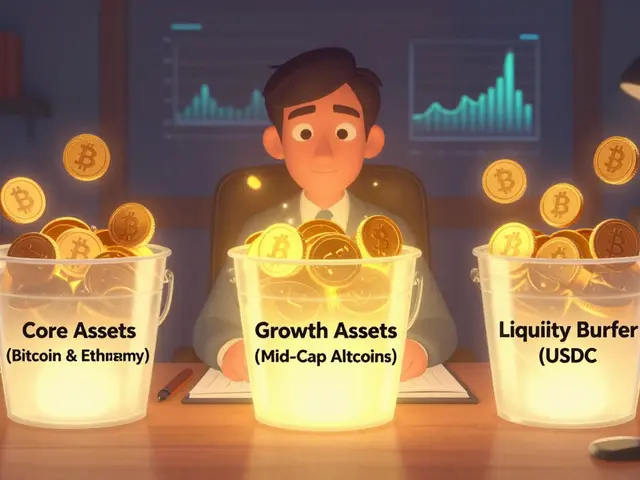Swiss Crypto Wealth Tax Calculator
This calculator estimates your annual wealth tax on cryptocurrency holdings in Switzerland based on official FTA conversion rates and cantonal tax rates. Results are for informational purposes only and should not be used as tax advice.
If you own Bitcoin, Ether, or any other digital token and call Switzerland home, you’ll soon wonder how the yearly wealth tax bill is calculated. The good news? Switzerland treats crypto assets much like stocks or bonds - they’re part of your net worth, not a separate income stream. The bad news? Each canton has its own rate, and you must use the official year‑end conversion numbers or carefully document platform prices.
Key Takeaways
- Cryptocurrencies are classified as crypto‑based assets and must be declared in the December31 wealth assessment.
- Private investors enjoy a full exemption from capital gains tax on crypto disposals.
- Wealth tax rates differ by canton, typically ranging from 0.3% to 1% of total declared wealth.
- Official FTA rates exist for major tokens; for others use the platform’s closing price or the original purchase cost.
- Professional traders or businesses are taxed on crypto gains as ordinary income.
Legal Framework Behind Swiss Crypto Taxation
Switzerland’s approach stems from the Federal Tax Administration (FTA) the federal body that issues tax guidelines and official conversion rates for digital assets. In a 2019 working paper and a 2021 update, the FTA defined crypto‑based assets (kryptobasierte vermögenswerte) and placed them under the same wealth‑tax regime as equities.
The DLT Act Switzerland’s Distributed Ledger Technology legislation that entered into force in August2021 gave legal certainty to token issuers and reinforced the tax treatment laid out by the FTA. Meanwhile, the financial regulator FINMA Swiss Financial Market Supervisory Authority classifies tokens as payment, utility, or security, which directly influences how they appear in the wealth‑tax calculation.
How Wealth Tax Is Calculated
Every canton requests a declaration of total net wealth as of 31December. Crypto holdings are part of that total. The steps are:
- Identify every wallet, exchange, or DeFi protocol where you hold assets.
- Use the FTA‑published year‑end rates for major coins - for example, Bitcoin (BTC) and Ethereum (ETH). In 2024 the FTA listed BTC at CHF28,500 and ETH at CHF1,850.
- If a token isn’t on the official list, take the closing price from the platform you used most often during the year. Record the exchange name, date, and price per unit.
- When no reliable market price exists, fall back to the original purchase price recorded in Swiss francs.
- Add the CHF value of all crypto assets to other wealth items (bank accounts, real estate, securities) and report the sum on the cantonal wealth‑tax form.
Each canton then applies its own rate. Zurich, for instance, uses 0.15% on the first CHF770,000 and 0.25% thereafter, while Zug’s flat rate sits at 0.3% on the entire amount. The cumulative effect is that a private investor with CHF200,000 of crypto assets might pay anywhere from CHF600 to CHF2,000 in wealth tax, depending on domicile.

Token Classification and Its Tax Implications
| Token type | Wealth‑tax inclusion | Capital‑gains tax (private) | Professional / business tax |
|---|---|---|---|
| Payment token (e.g., Bitcoin, Litecoin) | Included at market value | Exempt | Taxed as ordinary income if classified as trading activity |
| Utility token (e.g., Chainlink, Uniswap) | Included at market value | Exempt for private holders | Income from staking or usage fees taxed as income |
| Security token (e.g., tokenised shares) | Included at market value | Exempt for private investors | Subject to income tax on dividends and gains |
The classification mirrors FINMA’s approach and determines whether the token is treated more like a traditional security or a pure payment medium. For private individuals, the capital‑gains exemption holds across all three categories, provided the activity is not deemed professional trading.
Private vs. Professional Crypto Activities
Switzerland distinguishes private investors from professional traders using the criteria outlined in FTA circularno.36. Factors include transaction frequency, use of leverage, and whether the activity is the primary source of income. If you exceed roughly 10transactions per year or systematically rebalance a crypto portfolio, the tax office may reclassify you as a professional trader.
Professional traders face two tax consequences:
- Gains are added to ordinary income and taxed at the combined federal, cantonal, and municipal rates - often 20% to 40% depending on the canton.
- The wealth‑tax base still includes the assets, but the income tax component becomes far larger.
Conversely, a private holder who buys BTC in 2022 and sells it in 2025 enjoys a completely tax‑free capital gain, while the value of the remaining holdings continues to affect wealth tax.
Cantonal Variations and Optimization Strategies
Because wealth‑tax rates vary, many crypto‑rich residents consider domicile switches. The most popular cantons for low wealth tax are Zug, Schwyz, and AppenzellInnerrhoden, where rates hover around 0.3% to 0.5%.
Other optimisation tactics include:
- Family structuring: Transfer a portion of crypto to a spouse or minor child (subject to the child’s wealth‑tax threshold) to split the tax base.
- Timing disposals: If you anticipate a lower wealth‑tax rate next year due to a canton move, you might postpone a large sale until after the relocation.
- Using a “family foundation” in a low‑tax canton to hold the assets - a complex option that requires professional legal advice.
Remember, the cantonal tax office may scrutinise abrupt moves that appear solely tax‑driven. Maintaining genuine residential ties is essential.
Practical Steps for Year‑End Reporting
Here’s a checklist that keeps you compliant without drowning in paperwork:
- Export all wallet balances on 31December. Most wallet apps let you view a snapshot or generate a CSV.
- Gather the FTA official rates (download the PDF from the FTA website) for BTC, ETH, XRP, BCH, and LTC.
- For every non‑listed token, pull the closing price from the exchange you used most during the year. Save a screenshot showing date, ticker, and price.
- Calculate the CHF value:
Units × CHF price. Sum across all tokens. - Enter the total crypto value in the wealth‑tax section of your cantonal tax return (usually “Digital assets” or “Other securities”).
- Keep all supporting documents for at least ten years - the tax authority can request proof during an audit.
Tax‑software providers such as Koinly a crypto tax reporting platform that integrates Swiss FTA rates now include a built‑in Swiss wealth‑tax module. Importing your transaction history can speed up the process dramatically.

Recent Updates: Mining, Staking, and DeFi
Mining income has long been treated as business income, subject to ordinary income tax. The December2024 FTA clarification confirms that any net profit from mining operations-whether done personally or through a company-must be declared as income.
Staking and DeFi participation have nuanced treatment:
- If staking yields a fixed reward (e.g., a set % of the staked amount), the reward is considered income and taxed accordingly.
- When the staked token’s value simply appreciates without a separate reward, the increase is counted as wealth appreciation and only impacts the wealth‑tax base.
- Liquidity‑providing on a DEX generates transaction fees; those fees are treated as income.
Because the DLT Act is technology‑neutral, no new tax rules have been introduced for NFTs or emerging DeFi protocols. They fall under the existing wealth‑tax framework, meaning you still need to declare the market value of each NFT you hold at year‑end.
What Experts Say
Swiss tax advisory firms consistently rank the country as one of the friendliest jurisdictions for crypto investors. In a December2024 report, Koinly noted that “private investors won’t pay capital gains tax on their crypto gains” in most cases. Ark‑fid.ch highlighted the “clear legal framework and pragmatic approach” that lets investors focus on strategy rather than tax uncertainty.
That said, professionals warn that the administrative burden can be high, especially for investors holding many low‑liquidity tokens. Meticulous record‑keeping and a reliable tax‑software partner are essential to avoid penalties.
Frequently Asked Questions
Do I have to pay Swiss wealth tax on Bitcoin?
Yes. Bitcoin is classified as a payment token and must be reported at its year‑end market value in Swiss francs. The value then contributes to your total net wealth, which is taxed at the cantonal rate.
Are crypto capital gains ever taxed in Switzerland?
For private individuals, capital gains on crypto disposals are completely exempt. The exemption disappears if the tax office classifies you as a professional trader, in which case the gains are taxed as ordinary income.
What if I hold a token that the FTA doesn’t list?
Use the closing price from the exchange you used most during the year. Record the exchange name, date, and price per token. If no reliable market price exists, you may report the original purchase cost in CHF.
Does staking income increase my wealth tax?
Staking rewards that are paid out as separate tokens are treated as taxable income and subject to ordinary income tax. The underlying staked tokens remain part of your wealth‑tax base, so you’ll see an impact on both taxes.
Can I reduce my wealth tax by moving to a different canton?
Yes, because each canton sets its own rate. Relocating from a high‑tax canton like Zurich to a low‑tax canton such as Zug can cut the wealth‑tax portion of your crypto holdings by up to 70%. However, genuine residency requirements must be met to avoid challenges from tax authorities.
Conclusion: What You Should Do Next
To stay compliant and keep more of your crypto earnings, start by pulling together a complete list of wallets and exchange balances, apply the official FTA rates, and file the wealth‑tax declaration in your canton before the deadline (usually early March). If you’re approaching the professional‑trader thresholds, consider consulting a Swiss tax adviser to evaluate whether a change in trading style or a canton move makes sense.
Finally, keep an eye on updates from the FTA and FINMA - while the framework is stable, newer activities like DeFi staking are still being clarified each year.




16 Comments
VEL MURUGAN
The Swiss wealth tax framework treats crypto like any other asset, so you’ll be taxed on the CHF value at year‑end, not on gains. This means private investors still enjoy capital‑gains exemption while their holdings add to the wealth tax base.
Russel Sayson
Switzerland may be famed for its banking secrecy, but when it comes to crypto the authorities have drawn a clear line between income and wealth.
The Federal Tax Administration publishes a yearly conversion rate for every listed token, and cantonal authorities simply apply their wealth‑tax brackets to the CHF equivalent at December 31.
For a private holder, this translates into a modest levy that varies from roughly 0.15 % in Zurich to 0.45 % in St. Gallen, depending on the canton.
Professional traders, however, are caught in a different net, as their trading profits are treated as self‑employment income and subject to both income and wealth taxes.
The calculator you posted correctly pulls the official rates, but it also assumes you are a private investor, which is a crucial distinction.
If you swing a full‑time trading operation, you must also register as a self‑employed individual and declare your gross crypto profits.
Failure to do so can trigger audits, penalties, and, in the worst case, a classification as tax evasion.
Moreover, the cantonal thresholds mean that low‑value portfolios often escape the wealth‑tax floor, while high‑net‑worth individuals see a steep increase.
Zug, for instance, offers a flat 0.3 % rate, making it attractive for crypto‑rich expatriates, but it does not hide the tax from the federal level.
Another nuance is that the tax base is calculated on the market value, not on the purchase price, so sudden market swings can dramatically alter your liability from one year to the next.
This volatility is why many Swiss crypto enthusiasts keep detailed transaction logs and use portfolio trackers that snapshot values at year‑end.
In practice, you should run the calculator, note the estimated tax, and then consult a local tax adviser to verify the figures against your specific situation.
Advisors can also identify deductible expenses, such as hardware wallets, electricity for mining rigs, or even professional fees, which can shave off a few percentage points.
Do not forget that the wealth tax is payable in advance, usually as quarterly installments, so planning cash flow ahead of time is wise.
Finally, remember that tax law evolves; the Swiss government has signaled possible revisions to crypto reporting requirements, so stay informed each fiscal year.
Isabelle Graf
Anyone who thinks crypto is tax‑free in Switzerland is living in a fantasy.
Shane Lunan
The calculator looks slick but it won’t replace a real accountant’s eyes.
Jeff Moric
I’ve found it helpful to double‑check the cantonal rates manually.
Jordan Collins
When assessing wealth tax, the first step is to determine your domicile canton, as the rates differ significantly. Zurich’s progressive scale can start low but climbs quickly for higher net worth. Zug offers simplicity with a flat rate, which some high‑net‑worth individuals prefer. Always consider whether your crypto holdings qualify as private assets or professional activity, as the tax treatment diverges sharply.
Ken Lumberg
It’s morally indefensible to ignore tax obligations just because assets are digital. The law applies equally to crypto as to any other wealth.
Blue Delight Consultant
While the principle is sound, the execution often leaves room for interpretation. Taxpayers should defiantly seek clarity from cantonal authorities.
Wayne Sternberger
It is essential, albeit oft overlooked, to reconcile the wealth tax calculations with reported income. Neglecting this step could result in unforeseen obligations.
Gautam Negi
Contrary to common practice, many opt to overlook the subtle variances in cantonal thresholds, banking on the perception that crypto is a loophole. This reckless stance ignores the fact that Swiss regulators are increasingly vigilant, and any oversight may invite severe penalties. One must not underestimate the depth of scrutiny applied to digital asset portfolios. Embracing transparency safeguards both the individual and the broader financial ecosystem.
Shauna Maher
The wealth tax on crypto is just a front for the hidden agenda of global banking elites.
Kyla MacLaren
Let’s keep the discussion constructive and focus on the practical steps anyone can take. Sharing resources benefits the whole community.
Linda Campbell
From a national perspective, enforcing wealth tax on crypto fortifies Switzerland’s fiscal sovereignty and ensures equitable contribution from all citizens.
John Beaver
Indeed, aligning the calculator’s assumptions with your actual residency status is crucial. Mis‑classification can lead to over‑ or under‑payment. Consulting a tax professional remains the safest route.
Jennifer Bursey
Navigating the crypto‑wealth tax matrix demands a robust KYC‑compliant strategy and a granular audit trail, especially when dealing with cross‑border token allocations. Leveraging blockchain analytics platforms can illuminate hidden exposure and optimize your tax posture.
Maureen Ruiz-Sundstrom
One might argue that the imposition of wealth tax on intangible assets is a philosophical reflection of society’s attempt to quantify value. Yet, the aggressive enforcement underscores a deeper existential conflict between individual autonomy and collective responsibility. By confronting this tension, we uncover the true cost of digital abundance.